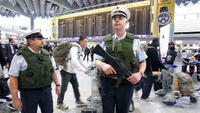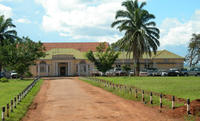-
Japan quake reconstruction could take ten years
Yesterday an advisory panel to the Japanese government announced that it could take a decade to rebuild Japan after the 11 March earthquake and tsunami wiped out much of north-eastern Japan; the council said that the first three years alone would be devoted to building roads and erecting temporary housing for the thousands of families that have been displaced; rebuilding towns could take another four years and a full recovery might take even longer; the damage from the recent quake was far greater than the large quake that struck Japan in 1995; Prime Minister Kan’s cabinet has approved almost $50 billion in spending for post-earthquake rebuilding
-
-
2002 Color-code terror alert system, RIP
On 26 April a new terrorist alert system — the National Terrorism Alert System (NTAS) — will go into effect, replacing the color-code alert system which has been in effect since 2002; the new system will include “imminent threat” and “elevated threat” alerts; the “imminent threat” alert will warn of a credible, specific, and impending terrorist threat against the United States; in some cases, alerts will be sent directly to law enforcement or affected areas of the private sector
-
-
Ensuring cyber infrastructure in rural areas meet demand in emergencies
Research groups at the University of California, San Diego are building a scalable computer infrastructure to provide better access to camera feeds from rural areas when fires, earthquakes, flash floods, or other natural disasters hit San Diego County; approximately 1,000 people visit High Performance Wireless Research and Education Network’s (HPWREN) Web page to view camera feeds on a typical day. On a not-so-typical day — like when snow recently blanketed large swathes of rural San Diego mountaintops — the number of visitors quadrupled
-
-
Mobile emergency detection app for Android phones
DefenCall smart phone app for Android users will be released in the second quarter; in the event of an emergency, users can tap on the app and it will automatically call, send text messages, e-mail any number of people that the user designates; the app will send the user’s name, contact information, and GPS location in addition to contacting first responders; DefenCall is currently being marketed to students on college campuses, those with chronic medical conditions, and travelers; the app costs roughly seventeen cents per day
-
-
Colorado education dept. to fund emergency comm. systems
Colorado will use a $41.5 million fund tied to the National School Lunch Act could be used to purchase emergency communications systems; the technology will improve communication between schools and first responders during an emergency
-
-
U.S. rules that Virginia Tech violated Clery Act during 16 April 2007 massacre
Virginia Tech may be fined $55,000 and lose some federal student aid over the way it alerted — or failed to alert — students on campus of the unfolding massacre on 16 April 2007; a federal report notes that a continuing education center and the university’s veterinary college were locked down, an official directed that the doors to his office be locked, and campus trash pickup was suspended after word traveled of the shootings — and that all of these actions took place before e-mails were sent to students, faculty, and staff on campus
-
-
Spain busts terrorist passport-stealing ring
Spanish police have arrested seven men suspected of having links to a Pakistani militant group blamed for the 2008 Mumbai attacks; the six Pakistanis and one north African are believed to be part of European network based in Barcelona that stole passports to order for the “World Islamic Front” a group connected to al Qaeda; members of the theft ring were tasked with stealing 40 passports a month, and they stole the passports from those whose age and nationality would best enable terrorists to use the falsified documents to travel freely across borders; the group sent the passports to be forged in Thailand from where they were distributed to criminal groups around the world including radical Islamic cells
-
-
Suspicious package found in German-bound airport bag

On Wednesday, Germany boosted security amid intelligence pointing to a planned terror attack; on Thursday, a suspicious package containing a detonator, batteries and a ticking clock was detected during screening at the main international airport in Namibia’s capital Windhoek; the package was found on a suitcase which could have been bound for Munich; the German authorities remain fearful about the current whereabouts of a group of Islamist militants who disappeared from a Hamburg mosque a year ago, some to turn up in training camps in northern Pakistan and Afghanistan; German interior ministers from federal and state governments met on Thursday in Hamburg to discuss the elevated threat. There were “concrete indications” that Berlin, Munich, Hamburg, and the Ruhr Valley were the likely targets of terrorist attacks
-
-
U.S. sees East Africa as front line in bioterrorism war

Africa emerges as the front line in the war against bioterrorism; anthrax killed hundreds of hippopotamuses in Uganda in recent years; in 2008 a Dutch tourist died from Marburg disease after visiting a cave in a national park; in 2007 an Ebola outbreak killed more than twenty people; American officials say that the underlying threat is that lax security at the poorly financed labs that collect and study these and other deadly diseases pose a bioterrorism risk; the rise of Islamist radicals in several countries in East Africa has refocused attention on this region as a frontier in American security interests
-
-
Engineers to enhance crane-mounted cargo scanning system
VeriTainer, a venture-backed specialist in crane-based radiation detection technology for scanning shipping containers, enters into a three-and-a-half years, $4 million n R&D agreement with Lawrence Livermore National Laboratory to enhance the gamma and neutron detection sensitivity of the company’s radiation scanners
-
-
The FBI discusses the Sovereign Citizen Movement
The FBI is educating the American public about the threat of domestic terrorism; it has already provided information on its Web side about eco-terrorists and lone offenders, and in the latest installment it discusses the Sovereign Citizen Movement
-
-
TV operators say FCC's broadband plan is a threat to homeland security
The National Association of Broadcasters, a group that represents TV broadcasters, says that what it regards as the Federal Communication Commission’s (FCC) anti-broadcast, pro-broadband prejudice is a threat to homeland security: in the event of a national disaster, broadband service will overload and shut down because it is not meant to accommodate everyone’s data-communications needs at once
-
-
Hughes shows digital signage iPhone application for instant emergency response
Hughes’s mobile application enables single-touch, instant delivery of emergency notifications for Hughes MediaSignage networks; application allows network administrators instantly to disseminate critical information and emergency notifications from their iPhone, iPod Touch, or iPad devices
-
- All
- Regional
- Water
- Biometrics
- Borders/Immig
- Business
- Cybersecurity
- Detection
- Disasters
- Government
- Infrastructure
- International
- Public health
- Public Safety
- Communication interoperabillity
- Emergency services
- Emergency medical services
- Fire
- First response
- IEDs
- Law Enforcement
- Law Enforcement Technology
- Military technology
- Nonlethal weapons
- Nuclear weapons
- Personal protection equipment
- Police
- Notification /alert systems
- Situational awareness
- Weapons systems
- Sci-Tech
- Sector Reports
- Surveillance
- Transportation
Advertising & Marketing: advertise@newswirepubs.com
Editorial: editor@newswirepubs.com
General: info@newswirepubs.com
2010-2011 © News Wire Publications, LLC News Wire Publications, LLC
220 Old Country Road | Suite 200 | Mineola | New York | 11501
Permissions and Policies
Editorial: editor@newswirepubs.com
General: info@newswirepubs.com
2010-2011 © News Wire Publications, LLC News Wire Publications, LLC
220 Old Country Road | Suite 200 | Mineola | New York | 11501
Permissions and Policies
